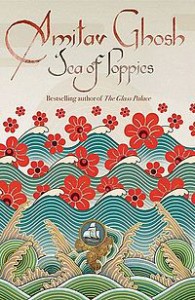 SEA OF POPPIES
SEA OF POPPIES
Amitav Ghosh
First published 2008
Let me tell you about buying this book. After being provided with a review copy of the third in this Ibis trilogy, I sought the first two books. I initially purchased them from the Book Depository, since despite its purchase by Amazon, it has served me well in the past, and given the size of the books, time was somewhat of the essence. Unfortunately, my order for the second book was cancelled after a few days and I was refunded. The first book, though, was ostensibly sent in early March. By the beginning of April, I had not received it. So I contacted the Book Depository and received a swift refund for that too. And I turned to Booktopia, which delivered both books promptly, albeit in rather strange jaffle-style packaging. Surprise, surprise, John Murray is a trading name of Hachette, with whom Amazon and by extention the Book Depository have been having a well-publicised tiff*.
Book finally in my hands, I expected something of a dour book. Nominated for the Man Booker Prize, Sea of Poppies is firmly targeted at a literary market. I feared it would be a worthy†, possibly depressing novel about serious issues. But while this book is certainly about the slightly serious issue of the first Opium War, it is neither dour nor worthy. In fact it is frequently hilarious.
As mentioned, Sea of Poppies is set in the lead up to the Opium Wars. It follows a number of characters who are drawn through the vicissitudes of life onto the Ibis, a merchant vessel whose owner has turned to shipping coolies after events in China lead to a collapse in opium prices. Amongst these is Deeti, a young widow; Zachary, the ship’s mate; Paulette, a runaway; and Neel, a fallen Raja. All of these characters and others are distinctly and carefully drawn. Ghosh draws enough on stereotypes for readers to find the characters familiar, which is most notable in the supporting cast, but never relies on these stereotypes to form the whole of his characters. This is a demonstration of superb skill and fills the novel with a great depth of warmth.
Given its subject matter, it is unsurprising that Sea of Poppies does not shy away from the tough issues, but it avoids preaching about the evils of colonialism while nonetheless making them evident. Ghosh achieves this largely through vicious parody; much of the humour in the book is derived from comedies of manners and from the sheer ridiculousness of British colonial society in Calcutta. Given the events of the book, this is often dry, dark humour.
I have had trouble coming up with a true complaint about this book. I suppose the only thing that comes to mind is the ease with which the character Zachary, a white-passing African American, decides to adopt a white persona. While his ambition is made clear, and it is also evident that he could not achieve what he desires from life if he did not pass as a white man, it is strange that the overt racism of many of his acquaintances does not appear to grate on him at all. This need not be expressed by him, and it need not be the crux of his story, but since we are inside his head the absence of any rancor at all is odd.
Sea of Poppies is a promising start to the Ibis trilogy. I look forward to reading the next two books.
*for what appear to be, on Hachette’s part, solid reasons.
†ETA: It has been brought to my attention that there may be confusion about the use of the word “worthy” in this review. In the sense used here, it describes a book that deals with heavy issues in a heavy, probably self conscious and pretentious way, to make the reader feel sad but all the nobler for having read it, and for the writer to congratulate themselves on for their own righteousness of heart. This has been the sense I have heard the word used in relation to books, though in retrospect it may be a term exclusive either to Scottish English or to my mother. If anyone would care to clarify this for me, that would be appreciated.

